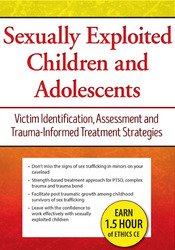

Are there kids on your caseload that your gut tells you something is not right? Often that is the first clue clinicians have that a child is being trafficked. Parents miss it, educators miss it, and unfortunately too many therapists miss the telltale signs. This workshop will immerse you in the experiences of commercially sexually exploited youth and provide you with competencies to work effectively from a trauma-informed perspective.
In this recording, learn from Kathleen Leilani Ja Sook Bergquist, JD, PhD, LCSW, as she draws on more than 20 years of working with survivors of sexual assault. Dr. Bergquist will show you effective clinical strategies to:
Working with these children can be complex, they often don’t see themselves as victims, and unprepared but well-intended clinicians can replace the trafficker from the youth’s perspective. As a clinician, there is nothing more rewarding than helping youth free themselves from the trauma bond of those who exploit them.
| File type | File name | Number of pages | |
|---|---|---|---|
| Manual - Sexually Exploited Children and Adolescents (5.58 MB) | 83 Pages | Available after Purchase |
Kathleen Leilani Ja Sook Bergquist, JD, PhD, LCSW, has spent over 20 years working with survivors of sexual trauma to include childhood sexual abuse, sexual assault and sex trafficking. Her work has been as a psychotherapist specializing in trauma and an attorney. The recent “discovery” of sex trafficking has spurred her to be an advocate and educator about sexual exploitation. Dr. Bergquist teaches a graduate course on human trafficking at the University of Nevada, Las Vegas’ School of Social Work where she is on faculty and has been called on as an expert in criminal mitigation cases and to train law enforcement, domestic violence providers, clinicians, and community stakeholders. She is also the clinical director of the Rape Crisis Center in Las Vegas, NV that works with survivors of all sexual violence including sex trafficking. Dr. Bergquist is a proponent for an ecological holistic approach to working with clients, focusing on the client as a whole within context, and not just treating the trauma.
Dr. Bergquist is an associate professor in the School of Social Work at the University of Nevada, Las Vegas. She earned her Juris Doctorate at the Boyd School of Law, UNLV; PhD in counselor education at the College of William and Mary; and her MSW at Norfolk State University.
Speaker Disclosures:
Financial: Kathleen Leilani Ja Sook Bergquist is an associate professor at the University of Nevada – Las Vegas. She receives a speaking honorarium from PESI, Inc. She has no relevant financial relationships with ineligible organizations.
Non-financial: Kathleen Leilani Ja Sook Bergquist is a member of the National Association of Counsel for Children (NACC); National Association of Social Workers (NASW); National Association of Social Work – Nevada; and Nevada Bar Association.
Please wait ...